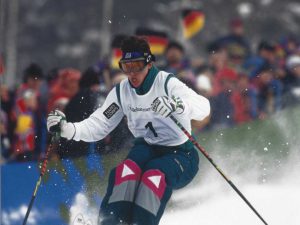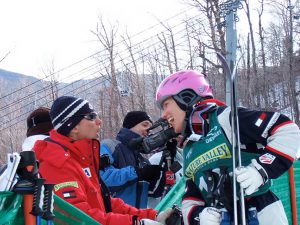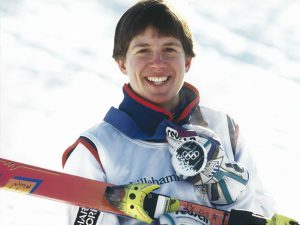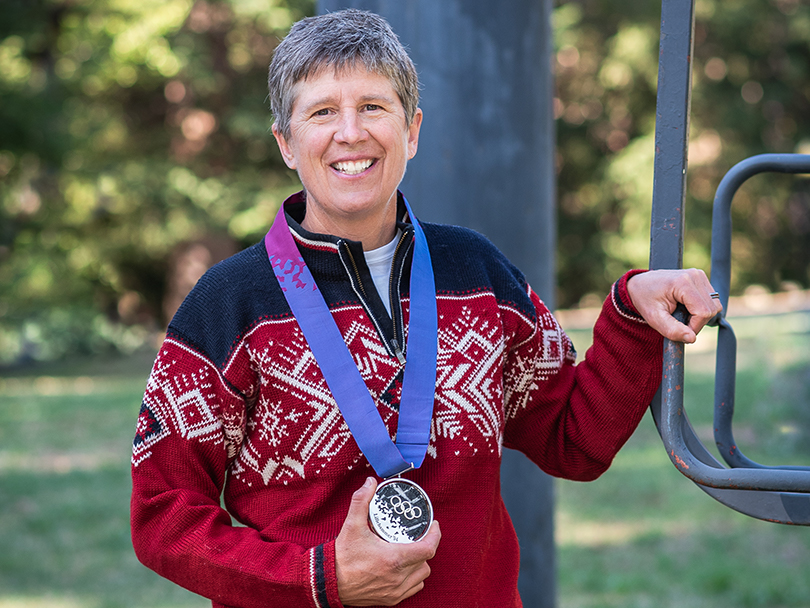By Eugene Buchanan –
Granby, Colorado’s Liz McIntyre, 55, is a board member for Mountain Parks Electric, one of CREA’s member co-ops. But she’s better known for her mogul skiing than her role at Mountain Parks. A former coach for the U.S. Ski Team and inductee into the 2008 U.S. Ski & Snowboard Hall of Fame, McIntyre is a three-time Olympian who won the silver medal in moguls at the 1994 Lillehammer Winter Games.

Liz McIntyre competes at the XVII Olympic Winter Games in 1994.
Electrifying spectators on the slopes — just like she does homes through Mountain Parks — she gave us an insider’s view of the upcoming Tokyo Games. Here, she sheds her own light on what it means to be an Olympian, from attending the opening ceremonies and socializing in the athlete cafeteria to the accommodations and being an athlete in the starting gate on the world’s biggest stage.
ON THE PANDEMIC POSTPONEMENT
That’s a huge one. You’re so focused on trying to peak at the right time and so excited you made the team and are headed to the Olympics. Then all of a sudden, screech! Stop! Time out for a pandemic! Training routines and practices are shut down; water douses that whole campfire of excitement. And a lot of athletes likely just recovered from qualifying and then had to put it on pause. That, and the uncertainty of if the Olympics will even happen, would be difficult to manage. Then add the complications of team sports still trying to practice and even something as simple as going to the gym. Your whole training regimen is upended.
For some athletes, COVID-19 forced changes to their housing, jobs and school, which complicated things even further. The potential to get the virus and the effect it could have on your health and athletic career is also a concern. The impact the pandemic has had on friends and family adds another layer of complexity. I can’t imagine what the Tokyo-bound athletes have gone through. Still, as trite as it sounds, adaptability, perseverance and focus are the hallmarks of all great athletes. There will be some spectacular performances in Tokyo.
ON THE COMMITMENT IT TAKES
Most people know it’s super hard to train for the Olympics and what kind of dedication it takes. But you also end up not attending things like family reunions, graduations, weddings and other events — things people on a less stringent training schedule would never skip. You’re away from home all the time. The more years you do it, the more of these life events you miss. And throughout it all, your family, friends and mentors are encouraging you and supporting you in multiple ways. It’s bigger than your dream. And then, in a year like this, you see the whole thing get canceled and think, “Oh, I have to wait another four years?” So it’s a huge commitment socially as well to be an Olympian.
ON ANTICIPATION
For a first-time Olympian, the months leading up to the Games can’t go by fast enough. The excitement is palpable. You’ve worked so hard and sacrificed all sorts of normal activities to pursue a dream. And now it is finally happening. For a veteran, the hard years of the four-year cycle are nearly over, and now it’s time to put it all on the line again. This is what you do, what you live for. But for both, you trained four years for this and you’re ready, so bring it. Above all, you’re looking forward to the Olympic competition day — as much or more than the whole Olympic experience.
ON THE OPENING CEREMONIES
They really cement the Olympic moment. Everyone is so excited, jumping up and down and giving each other high fives. You’re all sitting in the same bleachers and you realize that this is it, this is the Olympics. It’s a pretty momentous occasion.
Here’s what it was like at my first Olympics in France. That day we put on our opening ceremonies uniform as instructed, boarded a bus and drove the impossibly curvy road down the mountain to Albertville, where we exited into the warm valley air hinting of spring. We joined a growing mass of athletes staging for the ceremonies. Countries were delineated by their waving flags and colorful uniforms. It seemed like we waited forever to march into that stadium, but once we started there was no going back. The drab scaffolding gave way to cheering rows of spectators stretching up to the sky, music playing and rows of dignitaries. The U.S. team waved wildly at Vice President Dan Quayle. We wound around the stadium, following our flag bearer. My parents were up there somewhere.
It was pre social media, so we shared the experience with each other, drinking in the euphoria, excitement and anticipation. We jumped up and down, smiled, yelled, waved our hands in the air and danced. Then we settled into our seats. As the day faded into soft magic light, we watched a spectacular array of French artists and acrobats dance and fly around the stadium. After a few long speeches, they lit the torch just as night fell. Then we boarded the bus and slept our way back up the hill. When we arrived in Tignes, the torch was burning brightly on the side of the mountain. Let the games begin!

Liz McIntyre mingles with a fellow Olympian after her race.
ON THE GAMES’ SOCIAL SIDE
You’re taking in everything, but you’re pretty focused on the competition. It’s cool to see all the other athletes from the other disciplines, but you’re aware this isn’t social time; it’s the Olympics. But you do have a chance to go watch other events and cheer for Team USA. I liked going to women’s hockey games, figure skating, speed skating, ski jumping, bobsled and luge. Some athletes thrive in a more social setting like that, and others don’t.
ON DINING
Every venue is different. In France we were sort of off by ourselves, but Lillehammer had a big dining hall, which was a hub of activity. It was buffet-style with a bunch of different stations, so the food was really good with a lot of choices. Athletes cycled through constantly and there was an undercurrent of excitement and a feeling of commonality and respect. Usually, you sit with your teammates or other athletes you know from other events. I knew lugers from Dartmouth, as well as some of the Nordic and biathlon competitors. But you let Dan Jansen and Bonnie Blair have their space; I wasn’t the type to sit down right next to them. But I did say hi to Herschel Walker, who was pushing the bobsled.
One afternoon the dining hall erupted in applause when a luge athlete arrived from Sarajevo, which hosted the Olympics 12 years before but had since descended into bloody sectarian violence. Somehow he made his way out of a civil war to compete in Lillehammer. But your focus and mood depended on if you or the people you were with had competed yet or not.
ON THE ACCOMMODATIONS
In France, our accommodations were typical of what you’d get on a ski holiday; we weren’t at the village. But in Lillehammer we stayed in athlete housing in the main Olympic Village. And a village it was, with hundreds of two-story houses, painted in Norwegian shades of yellow or red, organized along narrow snowy paths leading to the main athlete center. The U.S. biathlon team shared the upstairs of the house where I stayed and a men’s hockey team was downstairs. They had practice at odd hours and a coach who yelled. We could hear everything.
I shared a room with Nikki Stone, an aerialist. There were all sorts of last-minute changes and we only found out who our roommates were a week earlier. The rooms were pretty small, but adequate. We created a little privacy by moving our wardrobes together in the middle. Eight of us shared the same bathroom, which worked ok, but involved some juggling on competition mornings.
In Nagano, the ski team rented a house closer to the venue and we slept on Japanese tatami mats. It will be interesting to see how organizers, teams and athletes address housing in the time of COVID-19.
ON THE MORNING OF
I’d been working with a sports psychologist for three years, so I had a good plan mapped out. My morning routine was to wake up, take a shower, eat breakfast (potatoes, and I always like grapefruit) and then hit the training course early. I was more nervous the day of my qualifying event than on the finals; if you don’t qualify, you don’t go to the dance. Everyone has their own timing and routine for preparing for their event. Some athletes have elaborate rituals; me, not so much. I always tried to get the feel of some good turns as I came into the starting gate and I found a quiet place I could get myself ready to go. I listened to music that would put me in the right state of mind. For Lillehammer it was Blue Rodeo, the Gin Blossoms and Melissa Etheridge. Back then it came from a huge Walkman; I remember a colossal argument one time on the bus about what music should be playing to appease 20 athletes. But sometimes the team had an anthem; in Albertville it was George Michael. Nowadays, everyone has their own device and playlist. Many even listen to it during their training.

After giving her race her best, Liz McIntyre is all smiles.
ON GETTING READY TO DO YOUR BEST
The moment that stands out most for me is the one right before my run. At the starting gate in Lillehammer, I stared out at a lake in the distance. I could see fog coming off of it. A crowd lined each side of the course, and a huge stadium was at the bottom. There was a ton of noise but I was just so at peace and ready. It was a great feeling and a moment I cherish as much as going across the finish line. Just knowing that I was ready. All that you’ve done to get here and then, bam! You’re about to go. There’s a pause before it all begins, which can seem like it lasts a long time even though it’s just a second long. It’s the same for everyone, whether you’re standing atop the swimming block or waiting for the starting gun in track.
ON ONCE IT’S ALL OVER
It depends on how you did. I was a little disappointed after my first Olympics, but I knew what I had to do and get better at. In Lillehammer, I put those skills to work and skied a great run. When you have your best performance during an Olympics it’s an exhilarating feeling. But you don’t have much time to reflect; you’re whisked off for drug testing, media events and the medal ceremony. So, I was pumped, but exhausted; it had been a long day. It didn’t really sink in until I got home to Colorado.
And it was different because I knew I was still competing. Nagano was my last time as a competitor, so it was more nostalgic. I didn’t adapt to the changing course conditions between training and the finals. That’s when you wish you had a chance to do it all over again; you want to rewind the tape and start all over. Everything you had worked so hard for is all over in 30 seconds. It can be a bit crushing after all the work you put in, but you learn about the journey, getting ready and disappointment and moving on. You win some and you lose some.
ON THE TOKYO GAMES AND STAYING SAFE
Tokyo 2020 will be a different Olympics. It will see athletes arriving from a world weary of the pandemic, and athletes who have been affected disproportionately and have had to question what is really important to them. Will the excitement, nervousness and anticipation be more muted or will a return to sport bring a joy not felt for the longest year ever?
And staying safe will be important. That whole aspect is unknown. How do you keep your team safe in a little bubble in a place like the Olympics? Even at past Olympics, by the second week people start catching colds that have come from around the world. Who knows what it will be like this year? Maybe because people are so careful no one will get anything. Still, you’re in pretty tight quarters. It’s going to be a much different Olympics.
Eugene Buchanan, a freelance writer who makes his home in Yampa Valley Electric’s territory, has written about outdoor sports for more than 25 years.

